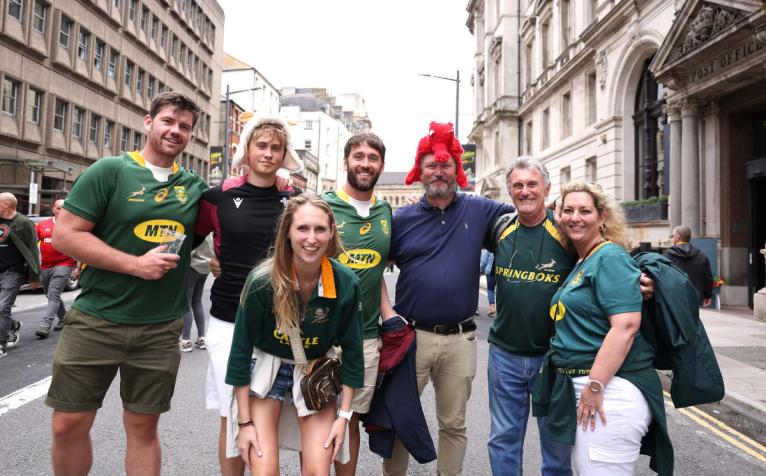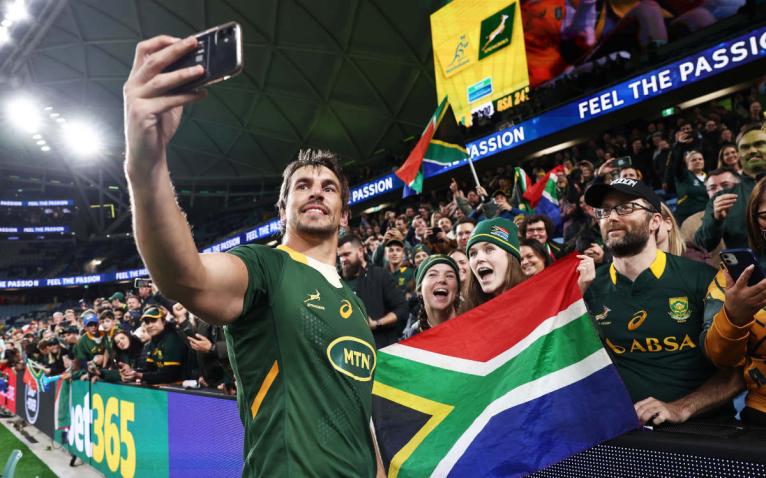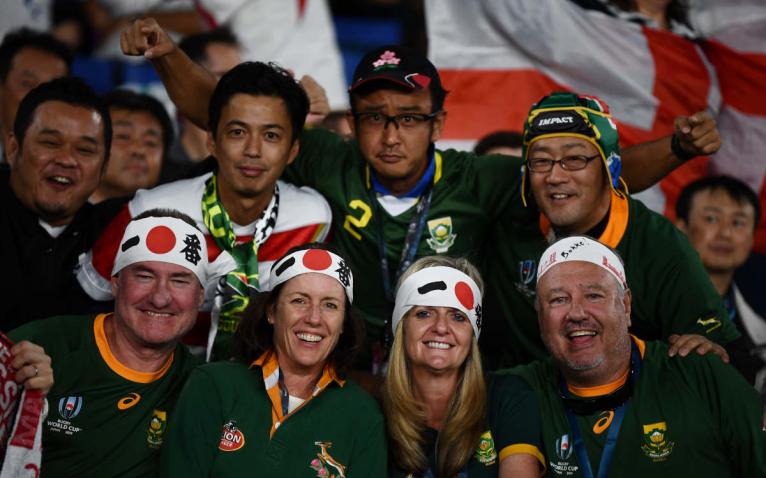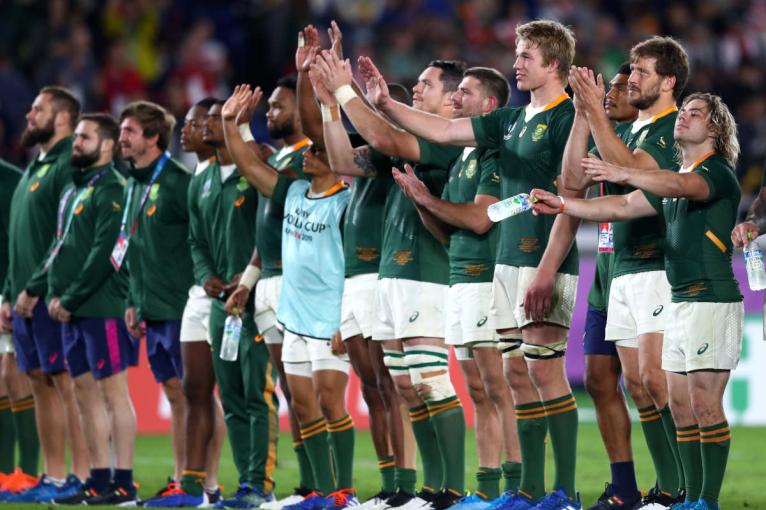It’s barely past noon and already The Cabbage Patch is heaving with punters and pints. Normally on the day of a Test match down the road at Twickenham Stadium, this famous pub is an England rugby stronghold, but there isn’t a red rose in sight. Instead, a leaping antelope has commandeered the place.
Every iteration of the Springboks’ jerseys worn over the years can be found here. There are decades-old versions with Lion Lager sponsors and frayed collars. The limited edition sevens jersey inspired by Nelson Mandela’s technicolored shirts stands out, as does the garish turquoise away strip that made its debut against Argentina a few weeks back.
Everywhere else is bottle green and flashes of gold. Somewhere unseen, deep voices sing Nkosi Sikelel’ i’Afrika. The staff behind the bar can just about keep up with the torrent of drinks orders. A full bottle of red wine crashes on the floor. One wonders how many fans will still be conscious by the time South Africa kicks off against the New Zealand All Blacks in seven hours.
Outside in the beer garden, two coal barbecues – or braais, as anyone inside the Cabbage Patch would call it – are already smoking. Except, that isn’t boerewors that’s being cooked but rather underwhelming English sausages.
“Whatever it is, they’re burning the hell out of it,” says one burly fan with a protea flower tattooed on his calf. “I wouldn’t wait in the line for that kak”.
Say what you want about South African culture, but few nations, if any, know as much about the union of animal flesh and open flames. I heed this unsolicited warning, finish my drink, and make my way over the River Crane and down Chertsey Road to the Stoop where more than 800 South Africans are congregating. I’m told there’s an authentic ‘wors roll with my name on it.

According to unreliable sources, there are around 915,000 South Africans living abroad. Some leave in pursuit of work opportunities or love interests but the majority seem to have grown dissatisfied with the situation back home. A flailing economy, made worse by regular electric blackouts, has stifled progress under the watch of a corrupt and uncaring government. Safety remains a serious concern and those with young families have understandably sought alternative environments to raise their children. Others are simply gatvol, as the locals would describe their gnawing ennui.
“All of that is true, but when the Boks are playing, all of that disappears,” says Dan Hooten, the founder of The Braai Army supporters group that has turned Harlequins headquarters into a base camp for Springboks fans. “We tell our members to leave their politics and gripes at the door. But other than the very occasional moan, we don’t have to police that. Once you put on your Boks jersey, and you wave the flag, and you eat some biltong, you’re transported to a familiar place. It’s like you’re back at home and nothing else matters.”
I always say that biltong and rugby go together like a torch and batteries. They work together. When you have a bowl of biltong and the Springboks are winning, how can you not be happy?”
Francois van der Zee, the owner of Limpopo Biltong
According to the Pulitzer Prize winning journalist, Mary Schmich, food is the medicine that blunts the pain of separation and for South African expats, cured and torched meats have profoundly healing properties. When paired with sport, especially the all-conquering Springboks, a powerful potion is concocted that can keep at bay even the worst pangs of homesickness.
“I always say that biltong and rugby go together like a torch and batteries,” says Francois van der Zee, the owner of Limpopo Biltong not far from Twickenham Stadium. “They work together. When you have a bowl of biltong and the Springboks are winning, how can you not be happy?”
Van der Zee has strong rugby roots. He grew up in the small town of Tzaneen to the north of Pretoria and showed some talent as a loosehead prop. Injuries curtailed his career but he did play at Loftus Versfeld on a few occasions for the Far North Rugby Union, the precursor to the Limpopo Bulls. After one too many knocks, he decided to move to the United Kingdom in 1997.

“I started working on a farm in Kent,” he explains from the seat of a tractor on his current farm in Lyne, west of London. “I carried on playing rugby. First in Gillingham and then a bit for London Irish’s reserves. Rugby is in my blood. It’s in the blood for a lot of South Africans. It was always my dream to do something with the Springboks.”
After establishing Limpopo Biltong a month before the 2007 World Cup, van der Zee consciously tethered his operation to the game he loved. “Business is much better when there’s a match on,” he says, explaining how targeted marketing campaigns have helped boost sales during the rugby season. “And business is even better when the Springboks are playing. You can imagine what it’s like when they win. I know it’s the same for all the other biltong suppliers in the UK. People want to feel that connection to home.”
This current crop of Springboks has advanced a transformative narrative. With Siya Kolisi as captain, and a core group of ‘non-white’ players and coaches, this is a side that better represents the demographics of the country.
To further strengthen this bond, van der Zee partnered with the 1995 World Cup winning Springboks. A few years back at the Savoy Hotel in London, he supplied over 30kg of biltong for a reunion of the victorious side. Thanks to Os du Randt and Kobus Wiese in particular, the mountain of meat disappeared in 20 minutes.
“That was the last time I saw Joost van der Westhuizen,” van der Zee says, who proudly shows a photo of himself and Francois Pienaar posing with the Webb Ellis Cup. “After that event we gave every player a platinum card with their name on it. With it they can go to any of my stores and get free biltong for life. I’d love to do the same for this current team. What they’ve done is incredible.”
More so than any previous iteration, this current crop of Springboks has advanced a transformative narrative. With Siya Kolisi as captain, and a core group of ‘non-white’ players and coaches, this is a side that better represents the demographics of the country.

However, back at the Stoop with the Braai Army, where the bar is serving double Klipdrift brandies and coke, the crowd is almost exclusively white. There are a few exceptions, and there is no hint of animosity or ill-will, but it does portray a warped perspective of a country where more than 80% of the population is black.
“We’re conscious of that,” admits Hooten, who once firmly instructed a member to put away an old apartheid flag that he was carrying, though this was a one-off incident. “It’s not that we’re counting by colour or anything like that. But we want to be representative and we want to be a place where South Africans of all races and religions and cultures can feel at home. It says more about the expat community than anything else. But we’re conscious to play music that will appeal to everyone and to do whatever we can to create a good vibe for all our members.”
Hooten, who was born in Zimbabwe but has been a lifelong Springboks supporter, owns his own travel and events company. In 2018 he recognised a gap in the market and helped arrange a tour for 10 expats to go to Ellis Park in Johannesburg to watch Rassie Erasmus’ first game in charge on home soil. Later that year, 120 fans travelled from London to Paris to see Bongi Mbonambi score a try in the 84th minute to steal the game.
A Covid-enforced hiatus only increased demand. More than 380 members watched the Springboks beat Wales in Cardiff in the Autumn of 2021 and 550 packed out several hotels in Edinburgh for the 30-15 win over Scotland. A partnership with South African Tourism is gaining momentum. Venues have already been booked to host events across France during the World Cup with parallel parties taking place back in the UK.
We joke that Wimbledon should be called Wimblefontein. When I took over this pub four months ago, it was a bit of a s**t hole. It needed something to set it apart. I realised that there were loads of Saffas about so it made sense to capitalise on that.
Rudi Keyser
Van der Zee will be on the ground in France as well. He’s already made reconnaissance missions across the Channel, scoping out the best areas to sell his meat. “We have a warehouse set up and we’re sending over the biltong pre-packaged,” he says. “I think we’re going to be very busy there.”
There will be options for those fans who will remain in the UK where almost a third of South African expats live. A popular destination will be the Horse & Groom pub about a seven minute walk from Wimbledon station, where Rudi Keyser has transformed an establishment on its last legs into a thriving South African haven.
“We joke that Wimbledon should be called Wimblefontein,” Keyser says, referencing the large cohort of South Africans in south-west London. “When I took over this pub four months ago, it was a bit of a s**t hole. It needed something to set it apart. I realised that there were loads of Saffas about so it made sense to capitalise on that. It was a business decision. But it’s become more than that.”
Keyser explains that he is now compelled by a sense of mission. Van der Zee and Hooten expressed similar motivations for what they do. “The first thing I did was take down the England flags and replace them with South African ones,” Keyser says. “Then you start thinking about what else you can do.

“It feels good to create this home away from home for people. If I notice that a group of South Africans walk in I make a point of playing Mendoza, or Johnny Clegg, or Miriam Makeba [some of the most popular musicians from the country]. I have Mrs Ball’s Chutney and All Gold tomato sauce. We stock Cream Soda so guys can have a John Deer [which gets its name from the sweet, green mixer]. We have a licensed food truck that serves boerie rolls and burgers. And when the Springboks are on, this place is jumping.”
The Springboks are the greatest cultural export the country has ever produced. And for the almost one million South Africans who now live abroad, the rugby team they support is also the most powerful anchor to their homeland.
That is especially true when the side is playing well and the Springboks have arguably never played better than they did against the All Blacks at Twickenham. By winning 35-7, they inflicted the largest ever defeat for New Zealand. In the streets and around the stadium afterwards, it was difficult not to feel the strong tug of nostalgia. Braai smoke filled your nostrils. Green and gold filled your vision. And the unmistakable twangs of South Africa, from the Cape to the Highveld, could be heard.
The Springboks are an ideal as much as they are a rugby team. Those who love them will hold them up as beacons of what’s possible in a country that has fallen short of its true potential. Those who scoff at the team’s own self aggrandising mythology will point out that three World Cup triumphs haven’t housed the homeless or fed the hungry.
Either way, they are the greatest cultural export the country has ever produced. They’re certainly the most successful. And for the almost one million South Africans who now live abroad, the rugby team they support is also the most powerful anchor to their homeland.



I think those 'proud South Africans' are better off supporting the English. If you want to leave 'dangerous, bad, blahblah SA' - then you can't keep the bits you like... Eating biltong, braaing and drinking brandy does not make you a South African. Those SA ex pats remind me of the Pakistani's in England, they love the English life, but remains Pakistani in everything else. Either assimilate or comeback, but spare us the 'die-hard South African-in-my fav-London-pub' nonsense.
Nigel… I’m a kiwi and saffa supporters are the best supporters of rugby anywhere in the world … we’ll apart from AB supporters… not sure where you are from but you obviously aren’t South African.
I’m a kiwi who married a South African and lived there for three years during apartheid…. I love the braai culture with real wood charcoal… much better than aussie or kiwi bbqs … they are boring in comparison…
It’s Mandoza not Mendoza.
Nigel, I appreciate your opinion, Opinions are like 🍑holes everybody has one; I went to Yokohama in 2019 & the Kiwi fans where a pleasure before the game, however they were so humble in victory combined with a few drunk, loud, & annoying Bok fans! 🙄
🇳🇿 supporters were who I talked & laughed with after the game.
Please, I beg of you to get with the win-win culture of the game we know & love & cease from post-trolling xenophobic comments in your safe place online. What you saying is akin to comparing English rugby fans to football fans... It is not one size fits all... I will get off my soapbox now‼️ 😂
Naaijill Naaijill..... what is bothering you?
Nigel you sound about as exciting as Steve Borthwick in a hurricane...Chuck Norris would fall asleep mid kick if he had to listen to you two...wahahaha
SA rugby fans overseas, particularly in the UK, are a national embarrassment to a once proud rugby nation. They are without doubt the most ignorant supporters of the game. They remind me a lot of school kids that have been instructed by the Head Master.
Nou ja, klippies and coke 😋 😋